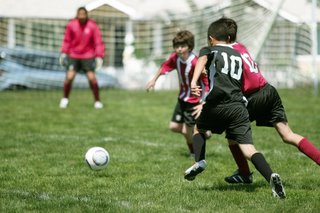“I’m the fastest runner in my class.”
“I can’t hit the ball as far as Jessica can.”
“I always get picked last for kickball teams.”
“I’m the worst in my P.E. class.”
 The outcome of most children’s sports, intended or not, is that kids discover their place in the pecking order of their peers. A few will be held in high regard as star athletes, the majority will be unobtrusive in the middle ground, and the very unlucky ones will be treated as outcasts – the ones always chosen last for team sports. In a school environment where emphasis is strong on athletic performance, students’ reputations in sports can determine how they are seen in all things and treated by their classmates.
The outcome of most children’s sports, intended or not, is that kids discover their place in the pecking order of their peers. A few will be held in high regard as star athletes, the majority will be unobtrusive in the middle ground, and the very unlucky ones will be treated as outcasts – the ones always chosen last for team sports. In a school environment where emphasis is strong on athletic performance, students’ reputations in sports can determine how they are seen in all things and treated by their classmates.
In Montessori, we generally de-emphasize competition and instead focus on cooperation. We don’t give grades or test scores, and even in the games the children play, we often choose ones where there is no winner or loser. Parents sometimes wonder if this lack of competition will hurt their child down the road; will the child be able to be a gracious winner or loser when needed?
It’s a Jungle Out There
Parents are only speaking the truth when they point out that this is a competitive world. They are right to feel concern over the idea that an adolescence devoid of competition is hardly a realistic mimic of the real world children enter after graduation. So far as we know, survival of the fittest is not only the reality that determines which tiger gets the fattest deer for dinner, but also the current way our world works when it comes to getting into your college of choice or landing a fantastic job.
Yet, people who cite the laws of the jungle as the rationale for the importance of competitive sports overlook the fact that humans have left the jungle behind in countless ways. It may be artificial that we’ve developed the ability to ‘fly’ but millions board airplanes every day. Our tools have made us an elective species with the power to choose so many things that don’t come ‘naturally’ to us, and it only stands to reason that we should be able to apply this to the goals and values our children inherit, along with the super-powered tool kit.
The Downside of Competition
Maria Montessori believed that competition in the educational environment was not only unnecessary, but harmful. When children are forced to compare themselves to peers, their focus is locked onto what others are doing rather than on perfecting themselves for self-satisfaction. When you add to this that psychologists have repeatedly documented how damaging and far-reaching the labels humans have pinned on them in childhood can be throughout life, the wisdom of competitive sports where someone is best and someone else is worst becomes very questionable.
Worst case scenario: a chubby little boy who is ridiculed for being slow or clumsy in a school P.E. class may develop a lifelong distaste for all physical activity and grow up to be an unhealthy adult because of it. Old feelings of self-loathing and shame may prevent him from ever taking pleasure in any kind of exercise that would help him to be a fit person. His brain may keep repeating the message, “I’m just not good at that,” indefinitely.
Equal danger is present for some children who show an early aptitude for school or league sports. When parents or coaches are obsessed with competition, a child’s whole worth can be summed up in whether she makes a basket or not. The ever-present potential for failure, shame and punishment can make little league kids’ lives a genuine misery.
The widely publicized instances of parental rage at children’s sports events are a perfect example of a set of values being passed from generation to generation. When you see those red-faced adults screaming at 10-year-olds to Win, Win, Win!, you have to wonder what happened to these people when they were young. You can pretty much bet that, somewhere along the line, their developing brains got overly stressed in a competitive situation. And, they’ve subconsciously decided that their own child is now a reflection of their desire to be successful in competition.
What’s The Point of Sports Where No One’s A Winner?
The key benefit of any physical activity is regulation of the metabolism, cardiovascular health and, according to modern medicine, the release of chemicals in the body and brain that make us feel happier and more energized. Activity is so important to wellness at every stage of life. How we approach the need for exercise is a choice.
Children can take pleasure in running without needing to see whether they run faster or slower than the child next to them. Other activities such as swimming, climbing, aerobics, gymnastics, track and field disciplines, horseback riding, dance, shooting hoops and certain martial arts techniques can be practiced solo without any need for comparison. Any child who is engaging in regular, stimulating pursuits like these is going to be a real winner because of the gain in health and vitality.
What About Team Sports?
This article from Education.com lists the following benefits young people can gain from participating in team sports:
 “Research has shown that sports contribute to psychological well-being by reducing anxiety and depression and enhancing self-esteem. In sports kids find a social milieu that can promote a spirit of social interaction, cooperation and friendship. Sports help kids think critically and solve problems, build self-discipline, trust, respect for others, leadership and coping skills, all of which form the foundation of character building. Sports have also been shown to improve academic and occupational outcomes, lower school dropout and deter delinquency. And, of course, sports develop the mind/body connection by strengthening the body and training the mind to use it for action and reaction.”
“Research has shown that sports contribute to psychological well-being by reducing anxiety and depression and enhancing self-esteem. In sports kids find a social milieu that can promote a spirit of social interaction, cooperation and friendship. Sports help kids think critically and solve problems, build self-discipline, trust, respect for others, leadership and coping skills, all of which form the foundation of character building. Sports have also been shown to improve academic and occupational outcomes, lower school dropout and deter delinquency. And, of course, sports develop the mind/body connection by strengthening the body and training the mind to use it for action and reaction.”
I confess to feeling skeptical about some of these claims, but perhaps the truth in them depends on how a sports program is being run by the adults in charge. Learning to work with a team is certainly an important lifeskill and if the emphasis is on interacting positively with others rather than determining winners and losers, I’d call the activity good. But I think about the millions of children enrolled in baseball, softball and soccer leagues and can’t help wondering if what they walk away with is a sense of cooperation or a win-lose mentality.
An alternative to these kinds of 2-team competitions that could still promote teamwork might be along the lines of a scavenger hunt. If a group of children is given a task of hiking, running, climbing and problem solving in order to find a series of hidden objects and everyone is part of the effort, everyone wins. There is no need to turn it into a competition. With creativity, educators will be capable of thinking of a variety of physical activities that involve cooperation without competition.
Additionally, if children express interest, on their own, in joining an after school sports league, they should be allowed to give it a try. The duty of the parents in this scenario is to make sure that the child understands the goal is to work with others. I see this as a real challenge and parents need to closely monitor how the coach interacts with the children and how the players are allowed to interact with one another.
What About Learning To Be A Good Loser?
Adults may feel reasonable concern that children who are raised in a non-competitive environment will not develop the skills they will need to deal with failure in the future. The very first time a young person goes to a job interview, they will be one of numerous candidates. Only one of the candidates will win the job. What will happen if this is the first time in that person’s life that they have ever faced competition of this kind? What will they do if they don’t get the job? Reactions could range from bewilderment, to shock, to an emotional meltdown.
Perhaps, then, the nature of competition does need to be introduced at some point during a child’s growth. A few ideas that come to mind might be participating in a national contest of some kind such as an essay competition or juried art contest. From such an activity, the child will understand that their offering is being compared to the work of others, but the remoteness of this will make the lesson less personal. It won’t affect the child’s primary living and working environment.
For a more physical approach, the GPS Geocaching games that are taking the world by storm do give kids a chance to participate in a multi-player sport but, again, finding the little tokens along the way on back country roads and signing your name in registry books is a step removed from direct competition with peers in the learning environment.
Teachers and Parents are the Key
The way an adult responds to a child’s win or loss is of utmost importance. Overreacting to either a win or a loss can lead the child to feel that their worth is based on how they perform in a competition. Even over-praising a win sends the message that “you are important because you succeeded”. Honest encouragement goes a long way to soothing a child’s hurt feelings, and specific evaluation, like “You worked so hard out on the field” is always more helpful than criticism or praise.
While it’s true that we need to prepare young people to survive in a competitive world, it is equally true that the more young people we raise by the Montessori method, the less cut-throat the world can be. As every successive generation leaves the primordial jungle farther and farther behind, the more opportunities we have to develop a system of valuing human worth along more humane and inclusive lines.

